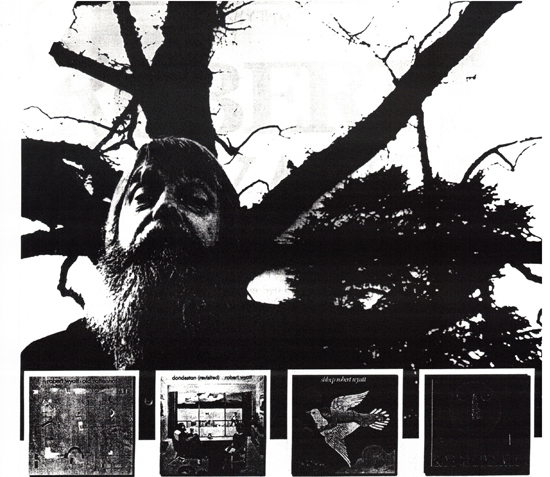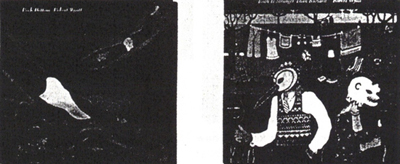| |
|
|
 Robert Wyatt in his own words - Get Rhythm - Issue 6 - August 2001 Robert Wyatt in his own words - Get Rhythm - Issue 6 - August 2001
From Soft Machine and Matching Mole, via Syd Barrett, Elvis Costello and Jerry Dammers, Paul Weller, Ultramarine and Gorky's Zygotic Mycini, Scritti Politti, Ben Watt and Ivor Cutler, Wyatt has instilled such love among his followers and fellow musicians that, through his many attributes - his emotional energy, his integrity and his generosity of spirit over a career spanning four decades - he is unique. Here he comments on five of his own classic albums and his EP box set (released by Hannibal Records) with Andy Farquarson.
|

|
THE PAST
Looking back over my career, I feel I got a second chance. In the 1960s, I think I was a bit too cocky, a bit too drunk, never saw things through properly. In one way, being in a wheelchair has been a blessing. It's slowed me right down, stopped me being so manic. And, of course, being married always civilises a chap. The paradox is that in order for your mind to wander freely, you need a fairly stable routine life.
CURRENTLY
I get asked to do a lot bits and pieces with other people, mostly abroad. Recently, I've sung for the double bass player and composer Laurie Scott Baker and also sung on a compilation CD celebrating the centenary of the birth of Lorca the Spanish playwrite.
I've got enough bits and pieces lined up for a recording in my own right but finding the time and space to do things is difficult. It takes me ages to develop things and I don't have a professional composing technique. Rather, I work organically. I suppose that's why I've only made six albums in the time that many of my contemporaries have made forty or so.
I feel rather left behind by the ever-more-rapid developments in recording technology. Machines nowadays seem to designed by electricians determined to dazzle one another at endless trade fairs - an admirable and exciting lifestyle no doubt - rather than to co-incide with what musicians actually need. Today you are saddled with complicated processes involving confusing technologies that don't give you the result you wanted.
ROCK BOTTOM
Like one's children, it's hard to pick a favourite from one's work. Obviously, everything I do is as good as I can make it. 'Rock Bottom' was me as a grown-up at last, me more in control of what I was doing. There'd been a couple of practice runs, such as the first Matching Mole LP, where I developed the technique of multi-recording myself. 'Rock Bottom" had a long incubation because it was interupted by a year on my back in hospital. That's when I realised you don't have to be in a group: it's not a law. My first influences were painters, not musicians, so I was at home with the idea of doing the drawing, putting on all the colours myself, the whole picture in fact.
RUTH IS STRANGER THAN RICHARD
'Ruth...' was more to do with acknowledging the work by the musicians who had enriched 'Rock Bottom', of thanking them. I was extremely lucky with them all Ruth was intended to bring them out more, bring them into sharper focus. There were features for Mike Oldfield, Gary Windo, George Kahn, Mongezi Feza and Fred Frith and the others. It was their record - I was much more just the coordinator really, and I did the singing. I think this was probably the first recording where I covered other, people's material.
OLD ROTTENHAT
'Old Rottenhat' was a real solo effort. I wrote it all and played it all on fairly primitive equipment I recall that one was for Jeff Travis on Rough Trade label. Vivienne Goldman had introduced me to him, explaining that he was an indie producer. I thought 'indie' meant proto-Bhangra - I always get these things wrong. 'Old Rottenhat' came after a break. I'd been with a certain high-profile label with what I thought was a ludicrous, even slightly pervey, name. Suddenly their mask as innovators and nurturers fell and they wanted hits. I thought 'Oh no, not all that again'. They told me my stuff was too lugubrious - I looked it up in the dictionary - and apparently that was a bad thing in a happy happy place full of happy happy people. Besides, you had to use their very expensive studio and be published by their rapacious publishing company. I found all that tedious and humiliating - perhaps I'd got too old or too posh. So I dropped out for a while and devoted a lot of time listening to other people's records, spending time with my wife Alfie, generally having a life. The Rough Trade got me back to work!
DONDESTAN
In the eighties, Alfie and I moved north. I could make more noise at night and have a proper music room with piano, drum kit and tape machine. At that time I had more tunes, more musical ideas, than I had lyrics, so 'Dondestan' is based on poems and word sketches by Alfie. She'd not written them for singing, they were just for herself really, but she writes very singable lines, very sibilant - I'll look that word up later. Setting words to music was a reversal of what I usually do, which is to start by building a musical landscape then populating it with words. I learnt the technique, though not in a formal sense, from working with the composer Michael Mantler. I had to mix Dondestan rather quickly because Rough Trade had a modest budget and studio time is very expensive. It wasn't until I got Ryko's backing recently that I could re-mix and resequence it properly and see it reissued under the title 'Dondestan Revisited'.
SHLEEP
Phil Manzanera made this record possible and I'm very grateful to him. He had a studio and said I could use it without having to watch the clock which was a breakthrough for me. He was near to London which meant I could work with musicians I hadn't seen for ages. I'd met and become friends with Brian Eno years before and he came in to sing on 'Heaps of Sheeps' and helped me mix the track. The mixing is a bit of a jumble but that's not Brian's fault - I buggered it about a bit. Paul Weller came into the studio to record so I said 'If you need any lugubrius backing vocals, I'm happy to do some for you'. He said very politely that he didn't but that if I wanted a bit of strumming on my record he'd drop in. Which he did. The trombonist Annie Whitehead, who I'd worked with in the past, came in too and Evan Parker the saxophonist. Everyone on it has their own character and that shines through so it is very much a group record.
THE EP'S
It was Geoff Travis who first suggested I speak to Hannibal and Ryko Records. I went and met them and they were terrific, lovely people. They not only put out 'Shleep' but reissued the earlier albums. That was wonderful for me. Then Ryko offered to collect and issue all the bits and pieces, the singles, the odd songs. We've put them out as a boxed set of EPs because Alfie suggested the material was too disparate to go on a single CD.
|




